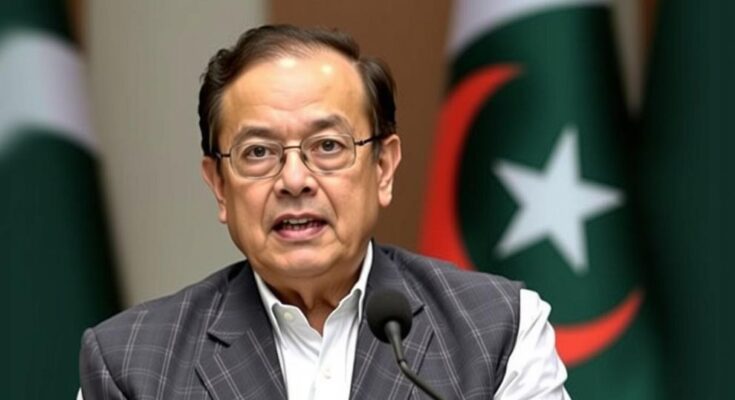Ishaq Dar’s visit to Bangladesh in February 2025 marks the first by a Pakistani foreign minister in a decade, following diplomatic meetings aimed at strengthening ties. Both nations are eager to enhance economic cooperation while addressing unresolved historical issues from 1971, as they look to redefine their relationship after a prolonged period of tension under previous leadership.
The anticipated visit of Pakistan’s Deputy Prime Minister and Foreign Minister, Ishaq Dar, to Bangladesh in early February 2025 marks a significant diplomatic event, being the first for a Pakistani foreign minister since 2012. This follows a recent meeting between Pakistani Prime Minister Shehbaz Sharif and Bangladesh’s Chief Adviser, Muhammad Yunus, during the D-8 Summit in Cairo, where both leaders expressed a desire to enhance bilateral relations. Dar’s proposed visit, scheduled after his trip to Malaysia, is seen as an opportunity to rebuild ties between the nations, potentially ushering in a new chapter of cooperation and partnership, particularly in economic and trade interactions.
During a press conference, Dar articulated that Bangladesh is akin to a “lost brother,” emphasizing the importance of strengthening trade and economic cooperation. Furthermore, he confirmed an invitation extended to Yunus for a reciprocal visit to Islamabad. The media has hailed Dar’s upcoming trip as a “groundbreaking development,” reflecting a thaw in relationships following the ousting of a government perceived as pro-Indian, which had soured diplomatic ties over the past fifteen years.
Ties had remained strained under the leadership of Sheikh Hasina, who had not reciprocated several attempts by Pakistan to improve relations. Importantly, the political landscape in Bangladesh changed following the August 5, 2024, ousting of Hasina, enabling more open discussions about cooperation. The recent re-establishment of direct maritime cargo routes from Karachi to Chittagong also demonstrates a revitalization of trade relations.
Notably, recent discussions have also highlighted the requirement for Pakistan to address historical grievances stemming from the 1971 conflict. Yunus has advocated for the resolution of these issues to facilitate progressive dialogue and relationship-building, stating, “The issues have kept coming again and again. Let’s settle those issues for us to move forward.” The continued call for reconciliation suggests a complex yet promising framework for Bangladesh-Pakistan relations moving forward.
The relations between Pakistan and Bangladesh have historically been fraught with tension, particularly following the 1971 war of independence, which has left lasting scars on diplomatic interactions. After years of strained communication during Sheikh Hasina’s administration, the recent political shift in Bangladesh has prompted new discussions about fostering bilateral ties. The engagement between the two countries has become more pertinent in light of new leadership in Bangladesh and a mutual desire to rekindle communication and cooperation, particularly in areas of trade and economic development. Furthermore, dialogue regarding historical grievances remains crucial as both nations seek to build a more constructive future.
Ishaq Dar’s forthcoming visit to Bangladesh signifies a pivotal moment in Pakistan-Bangladesh relations, marking a decade since the last official visit by a Pakistani foreign minister. The recent political changes in Bangladesh, coupled with mutual invitations for dialogue and cooperation, suggest a commitment to mend and strengthen ties. However, the need to address historical issues from the 1971 conflict persists, indicating that while progress is being made, significant discussions will be essential for a lasting reconciliation and improved bilateral relations.
Original Source: indianexpress.com




